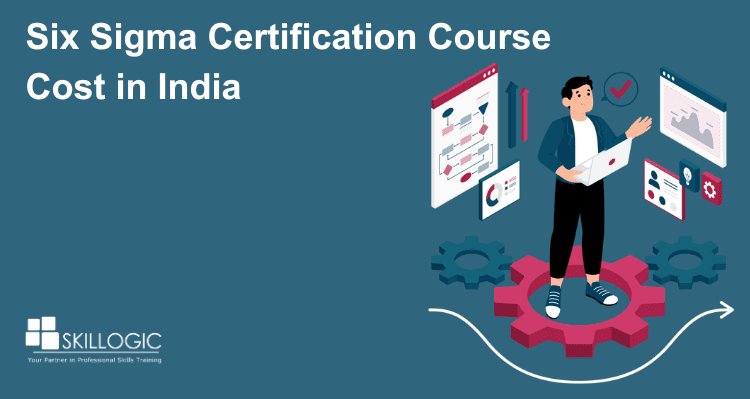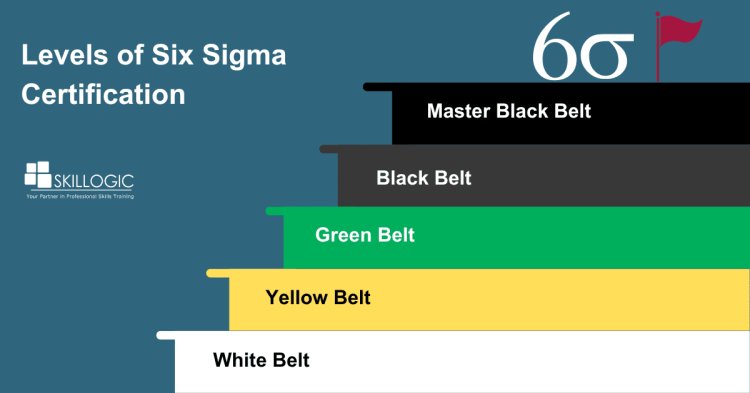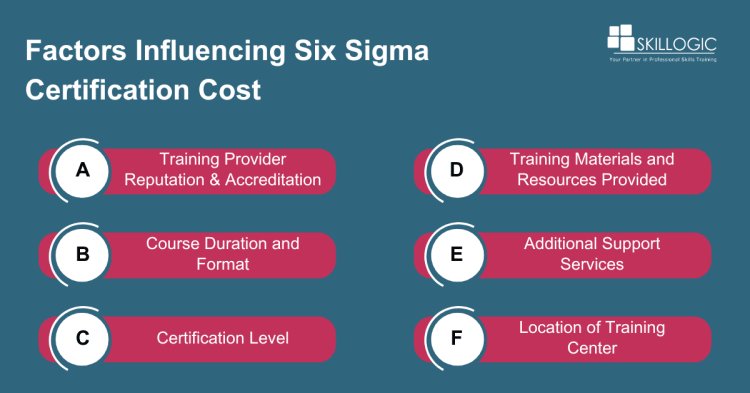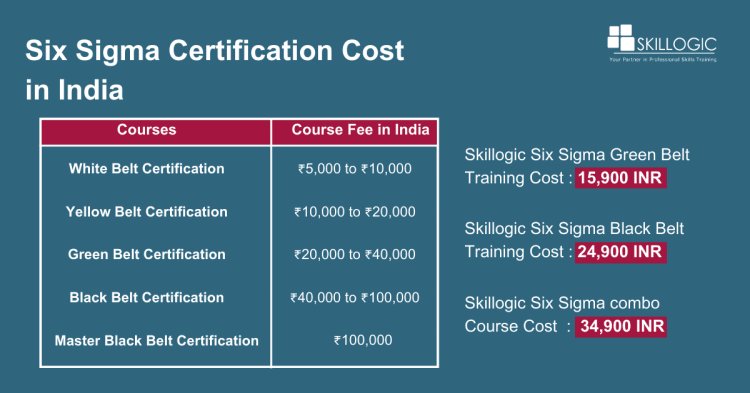Six Sigma Certification Training Course Cost in India

In today's tough business world, being ahead is super important. Picture having a special certification that not only makes you better at your job but also makes you stand out from others. That's what Six Sigma certification does. Six Sigma is like a superhero for businesses, helping them fix mistakes and make things better. It's like using a magic wand to make everything work smoother and faster.
Today, we'll explore why Six Sigma Certification in India is a game-changer in India's business scene. We'll break down the factors that affect the cost of Six Sigma training and show you why it's worth every penny.
Overview of Six Sigma Certification
Six Sigma is like a secret formula for businesses to achieve perfection. Its main goal? To make processes better, faster, and error-free. Imagine a world where every product is flawless and every service is impeccable. That's the dream of Six Sigma.
The projected growth of the global quality management software market to USD 20.66 billion by 2030, with a compounded annual growth rate (CAGR) of 10.6% from 2023 to 2030, reflects the increasing adoption of advanced technologies and the growing emphasis on quality assurance across industries. (ResearchandMarkets) This surge is driven by factors such as the rising need for regulatory compliance, the desire to enhance operational efficiency, and the escalating demand for improved product quality and customer satisfaction.
Here are the levels of six sigma certification:
White Belt:
- Entry-level certification providing basic understanding of Six Sigma principles.
- Typically involves introduction to concepts like DMAIC (Define, Measure, Analyze, Improve, Control) and basic quality tools.
- Often targeted towards employees who will be involved in Six Sigma projects but not leading them.
Yellow Belt:
- Builds upon White Belt knowledge with a deeper understanding of Six Sigma concepts.
- Focuses on applying basic six sigma tools and techniques within specific projects or processes.
- Yellow Belts often serve as team members or support personnel for Green and Black Belt projects.
Green Belt:
- Intermediate-level certification involving comprehensive training in Six Sigma methodologies.
- Equips individuals with skills to lead small to medium-sized improvement projects within an organization.
- Green Belts analyze data, identify root causes of issues, and implement solutions to drive process improvements.
Black Belt:
- Advanced-level certification for individuals who demonstrate mastery of Six Sigma principles and techniques.
- Black Belts lead complex improvement projects, mentor Green Belts, and drive organizational change.
- They possess deep knowledge of statistical analysis, project management, and leadership skills necessary for successful implementation of Six Sigma initiatives.
Master Black Belt:
- Highest level of Six Sigma certification, reserved for experts who have demonstrated exceptional proficiency in six sigma methodologies.
- Master Black Belts provide strategic guidance, mentorship, and training to Black Belts and other team members.
- They play a key role in driving Six Sigma culture throughout the organization and achieving significant business results.
The perks of six sigma certification in India are like gold stars for both individuals and companies. For professionals, it means better job prospects, higher salaries, and recognition for their expertise. For organizations, it's a recipe for success - improved processes, increased efficiency, and ultimately, happier customers.

Impact of Six Sigma Certification on Career Advancement and Business Performance
In India, the market for Six Sigma certification has experienced significant growth in recent years, particularly in industries such as information technology, manufacturing, healthcare, and financial services. As the Indian economy continues to expand and global competition intensifies, Six Sigma-certified professionals are in high demand, commanding premium salaries and playing pivotal roles in driving organizational excellence and competitiveness. Six Sigma Certification in India can have a profound impact on both career advancement and business performance. Here's a breakdown of its effects:
Career Advancement:
- Enhanced Skill Set: Six Sigma certification equips professionals with advanced problem-solving and analytical skills. This makes them highly valuable across various industries and sectors.
- Increased Marketability: With Six Sigma certification, individuals stand out in the job market. Six Sigma job roles in India include positions such as Six Sigma Consultant, Quality Manager, Process Improvement Analyst, and Operations Manager. These roles demand expertise in Six Sigma methodologies to drive efficiency, quality, and continuous improvement within organizations, making certified professionals highly sought after in the job market.
- Leadership Opportunities: Six Sigma certification often opens doors to leadership roles within organizations. Individuals who are certified can lead process improvement projects, manage teams, and drive organizational change, leading to rapid career progression.
- Global Recognition: Six Sigma is recognized globally as a standard for quality management. TUV certification and recognition by the International Council for Quality (ICFQ) further solidify the global standing of Six Sigma as a benchmark for quality management. These accreditations provide professionals with internationally recognized credentials, enhancing their credibility and marketability on a global scale.
- Salary Advancement: Certified Six Sigma professionals typically command higher salaries compared to their non-certified counterparts. In India, Six Sigma Black Belts command salaries ranging from ₹5.5 Lakhs to ₹25.0 Lakhs annually, with an average of ₹16.2 Lakhs. This reflects the high demand for professionals skilled in advanced quality management techniques. (AmbitionBox) Meanwhile, Lean Six Sigma Green Belts earn an average annual salary of ₹7,20,000, indicating the value placed on expertise in process optimization and efficiency enhancement within Indian industries. (Glassdoor)
Business Performance:
- Process Improvement: Six Sigma methodologies focus on eliminating defects and improving processes. Certified professionals lead initiatives to streamline operations, reduce waste, and enhance efficiency, ultimately leading to higher quality products or services.
- Cost Reduction: By minimizing errors and optimizing processes, Six Sigma initiatives lead to significant cost savings for businesses. This can result from reduced rework, lower scrap rates, and more efficient resource utilization.
- Customer Satisfaction: Improved processes often translate to better products or services, leading to higher levels of customer satisfaction. Six Sigma's customer-centric approach ensures that businesses deliver value that aligns closely with customer needs and expectations.
- Competitive Advantage: Companies that embrace Six Sigma gain a competitive edge in the marketplace. They can deliver higher quality products or services more efficiently than their competitors, which can lead to increased market share and profitability.
- Data-Driven Decision Making: Six Sigma focuses on using data and numbers to make decisions. Certified experts use special tools and math to find out why things go wrong and to make smart choices. This helps them solve problems better and plan smarter for the future.
- Organizational Culture: Implementing Six Sigma fosters a culture of continuous improvement within an organization. Employees at all levels become more engaged in identifying opportunities for enhancement and are empowered to contribute to the company's success.
Read these articles:
Factors Influencing Six Sigma Certification Costs
Training Provider Reputation and Accreditation:
- Renowned training providers with strong industry recognition and accreditation often command higher fees due to their established quality standards and credibility.
- Accredited six sigma programs in India ensure adherence to recognized standards and may offer additional value in terms of certification validity and recognition.
Course Duration and Format:
- The duration and format of the course significantly impact its cost. Traditional six sigma training offline in India may be more expensive due to facility and instructor costs.
- Online six sigma courses in India are typically more affordable as they eliminate overhead costs associated with physical infrastructure.
- Blended formats, offering a mix of six sigma training online in India and in-person instruction, provide flexibility and may come at a moderate cost.
Certification Level:
- The complexity and depth of training required for different certification levels influence course costs.
- Entry-level certifications like White Belt may have lower fees compared to advanced levels such as Black Belt, which require more extensive training and expertise.
Training Materials and Resources Provided:
- The quality and comprehensiveness of training materials, including textbooks, software tools, and online resources, contribute to course costs.
- Courses offering high-quality materials and access to specialized resources may justify higher fees by enhancing the learning experience and effectiveness.
Additional Support Services:
- Training programs offering supplementary services like exam preparation, coaching, and practice exams may have higher associated costs.
- These services can improve the chances of certification success and provide added value to participants seeking comprehensive support throughout their learning journey.
Location of Training Center:
- Geographical location can influence course costs due to variations in living expenses and market demand.
- Training centers located in urban areas or regions with a high cost of living may charge higher fees compared to those in less densely populated or rural areas.

Cost Breakdown of Six Sigma Certification Cost in India
Understanding the six sigma course in India is essential for individuals seeking to enhance their skills and credentials in quality management through Six Sigma certification training in India. Below, we outline the average costs for each certification level in India:
- White Belt Certification: Typically ranges between ₹5,000 to ₹10,000, offering foundational knowledge in Six Sigma methodologies.
- Yellow Belt Certification: Priced around ₹10,000 to ₹20,000, providing a deeper understanding of Six Sigma tools and techniques.
- Green Belt Certification: Costs approximately ₹20,000 to ₹40,000, equipping individuals with the skills to lead process improvement projects.
- Black Belt Certification: Ranging from ₹40,000 to ₹100,000, offering advanced training for leading complex Six Sigma initiatives.
- Master Black Belt Certification: Prices vary widely, generally exceeding ₹100,000, representing the highest level of expertise in Six Sigma methodologies.
SKILLOGIC, a renowned training provider, extends its offerings to include comprehensive Six Sigma Certification Courses in India.
- For individuals seeking to enhance their skills in process improvement, our Six Sigma Green Belt Training Cost in India is 15,900 INR.
- Those aiming for advanced proficiency can opt for our Six Sigma Black Belt Training Cost in India is priced at 24,900 INR in India, enabling participants to master complex methodologies and lead impactful projects.
- SKILLOGIC provides a combined training program, covering both Green Belt and Black Belt certification, at a bundled six sigma combo course cost in India of 34,900 INR.

Analysis of Value Proposition: What You Get for Your Investment:
Comprehensive Curriculum:
Six Sigma Courses in India offer a comprehensive curriculum covering a wide range of concepts, tools, and methodologies essential for driving process improvement and achieving organizational excellence.
Experienced Instructors:
Training is delivered by certified professionals with extensive industry experience, providing participants with valuable insights, practical examples, and real-world case studies to enhance learning outcomes.
Access to Resources:
Participants gain access to a variety of training materials, software tools, and online resources designed to facilitate learning and support ongoing skill development.
Certification Validity:
Accredited Six Sigma Programs in India offer certifications that are recognized and respected within the industry, enhancing professional credibility and opening up new career opportunities for participants.
Practical Application:
Hands-on projects and case studies allow participants to apply Six Sigma principles in real-world scenarios, honing their problem-solving skills and gaining valuable experience in process improvement methodologies.
Networking Opportunities:
Six Sigma Training in India often provide opportunities for participants to network with peers, industry experts, and potential employers, fostering collaboration, knowledge exchange, and professional growth.
While the cost of six sigma certification training in India represents a financial investment, the value gained in terms of enhanced skills, career advancement prospects, and organizational benefits often justifies the expenditure. It is crucial for individuals to carefully evaluate different training providers based on their offerings, reputation, and alignment with personal and professional goals.
Refer to these article: How important is Six Sigma?
Tips for Choosing the Right Six Sigma Certification Training Course in India
Choosing the Best Six Sigma Course in India is crucial for enhancing your skills and advancing your career. Here are some helpful hints to help you make a smart choice:
A. Research and Compare Training Providers:
- Conduct thorough research on different training providers, their reputation, and the quality of their programs.
- Compare course offerings, curriculum, and delivery methods to find the best fit for your learning preferences and goals.
B. Consider Your Budget and Training Needs:
- Determine your budget for six sigma certification course in India and consider the cost of courses offered by various providers.
- Assess your training needs and objectives to ensure the course you choose aligns with your career aspirations and skill development requirements.
C. Look for Accredited Programs and Experienced Instructors:
- Prioritize accredited Six Sigma programs that adhere to recognized quality standards and certifications.
- Choose courses led by experienced instructors with practical industry experience in implementing Six Sigma methodologies.
D. Read Reviews and Testimonials from Previous Participants:
- Seek feedback from previous participants or alumni of the training programs you're considering to gain insights into their experiences.
- Read online reviews and testimonials to gauge the effectiveness and reputation of the training provider and course content.
E. Inquire About Additional Support and Resources Provided:
- Inquire about the additional support services and resources offered as part of the training program, such as exam preparation materials, practice exams, and post-training support.
- Ensure the training provider offers comprehensive support to help you succeed in obtaining Six Sigma certification and applying your skills in real-world scenarios.
By following these tips and thoroughly evaluating your options, you can choose the right Six Sigma certification training in India that meets your needs and sets you on the path to success in quality management and process improvement.
Read this article: Let’s Understand the 5 S of Six Sigma
End Note
Six Sigma certification training plays a pivotal role in driving business excellence by equipping professionals with the skills and knowledge needed to implement rigorous quality management practices and drive continuous improvement. As businesses worldwide strive to remain competitive in today's dynamic market landscape, the demand for Six Sigma-certified professionals continues to grow.
SKILLOGIC Training Institute, a leading provider of professional training and certification courses, offers Six Sigma Courses in India accredited by both the International Council for Quality (ICFQ) and TUV. With SKILLOGIC's comprehensive training programs, individuals can gain the expertise needed to excel in quality management roles and make significant contributions to organizational success.

0
544